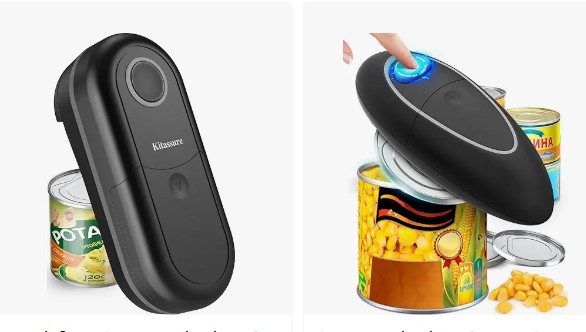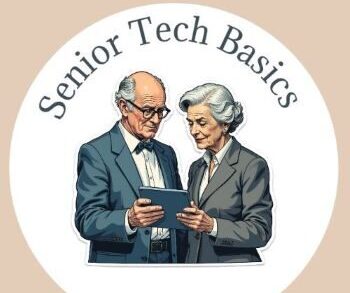
Living with Dementia often brings daily challenges that can make familiar spaces, such as the kitchen, feel overwhelming or even unsafe.
Older adults with dementia often find it challenging to perform simple tasks such as opening jars or peeling vegetables when memory, coordination, or hand strength begins to decline.
Ergonomic and adaptive kitchen tools help seniors with dementia maintain confidence in the kitchen while reducing the risk of accidents.
Soft-grip handles, non-slip designs, and automatic functions give older adults more control over their daily routines, helping them stay engaged in meaningful activities like cooking and mealtime preparation.
That’s why we feel compelled to share a guide to help families and caregivers choose the right ergonomic kitchen tools, making cooking safer, easier, and more enjoyable for older adults.
How Kitchen Tools Help Seniors with Dementia?
Not only does the kitchen enable older adults to cook, but it is also a space tied to independence, daily routine, and personal dignity, which can quickly become sources of frustration or safety risks for those with dementia.
Still, ergonomic kitchen tools can help seniors:
- Reduce the physical effort, allowing seniors to continue doing familiar activities with minimal assistance.
- Help prevent accidents by eliminating the need for dangerous knives or heavy equipment.
- Reducing frustration and stress caused by confusion, anxiety, or agitation for someone living with dementia.
- Support caregivers who may experience less pressure when seniors manage more tasks on themselves.
The Alzheimer’s Society offers expert advice on how to make kitchens safer for people living with dementia.
Key Features to Look for in Ergonomic Kitchen Tools.
The most essential features to prioritize when selecting ergonomic kitchen tools for seniors include:
Easy-Grip Handles.
- Designed with soft, cushioned grips that reduce strain on weak or arthritic hands.
- Prevent slipping even when wet, which is essential for safety.
- Larger handle designs are easier to control than thin, narrow ones.
Lightweight Construction.
- Lightweight tools to lift and maneuver reduce fatigue.
- They are ideal for seniors who struggle with hand tremors or reduced strength.
- Ensures that kitchen tasks don’t become overwhelming.
Non-Slip Surfaces.
- Textured handles and anti-slip bases help keep tools steady.
- Non-slip cutting boards and mats minimize the chance of accidental cuts.
- Great for seniors with limited coordination or shaky hands.
One-Handed or Hands-Free Operation.
- One-handed cutting boards, automatic can openers, or ergonomic peelers allow seniors to work more independently.
- Hands-free tools reduce the need for multitasking, lowering accident risks.
- Helpful in moderate dementia stages.
Safety Enhancements.
- Look for features like automatic shut-off, rounded edges, or stable bases.
- Built-in safety mechanisms reduce the chances of burns, cuts, or spills.
- Helpful for caregivers managing kitchen safety.
Simple, Intuitive Design.
- Minimal buttons or steps minimize confusion for those with memory issues.
- Look for clear markings, large fonts, and simple functions that make the use straightforward.
- Avoid complicated electronic displays or complex assembly.
Easy to Clean and Maintain.
- Smooth surfaces and dishwasher-safe materials save time and energy.
- Seniors or caregivers can clean up quickly without disassembly.
- Helps maintain good hygiene and prevents clutter buildup.
Our guide to the Audien Atom hearing aids can also help to improve daily independence for older adults.
Top Ergonomic Kitchen Tools For Seniors With Dementia.
Ergonomic Peelers.

Tremors, reduced hand strength, and loss of coordination increase the risk of slips and cuts, especially when using traditional peelers with thin metal handles.
That’s why ergonomic peelers are essential for providing seniors with a safer, steadier, and more comfortable grip, allowing them to participate in daily food preparation with confidence.
Below is why ergonomic peelers matter for dementia care.
- Soft, non-slip handles minimize hand strain and help prevent the peeler from slipping, even if hands are shaky or wet.
- Stable and comfortable tools allow seniors to peel fruits and vegetables on their own, building confidence.
- Caregivers can focus their attention elsewhere without constant supervision when seniors can safely participate in small kitchen tasks.
- Ergonomic handles and horizontal blade designs help prevent accidental cuts, which can happen easily with standard peelers.
OXO Good Grips Swivel Peeler.
Key Features.
- Cushioned, slip-resistant handle that’s comfortable even for a weak grip.
- Sharp stainless-steel blade that peels easily with minimal pressure.
- Dishwasher safe, making cleanup quick and simple.
Why is the tool ideal for Seniors with Dementia?
The OXO Good Grips Swivel Peeler’s thick handle is easy to hold, reducing frustration and fatigue, and making it straightforward to use.
Grips Swivel Peelers are also affordable, reliable, and long-lasting blades. However, manual peelers may not suit advanced dementia or severe arthritis.
Joseph Joseph Ergonomic Peeler.
Key Features.
- Compact, lightweight design with a non-slip rubberized grip.
- Sharp precision blade for smooth, clean peeling.
- Dishwasher safe for easy maintenance.
Why is the Joseph Joseph Ergonomic Peeler Ideal for Seniors with Dementia?
This simple, lightweight minimizes hand fatigue and is easy to operate with just one hand, making it more accessible.
However, the blade may dull a bit faster with heavy use.
Easi-Grip Vegetable Peeler.
Key Features.
- Angled handle for a natural wrist position, reducing strain.
- It is lightweight and balanced, which is ideal for shaky hands.
- Easy to clean, dishwasher safe.
Why is the Joseph Ergonomic Peeler Ideal for Seniors with Dementia?
This ergonomic pealer is perfect for those with arthritis or reduced dexterity because its angled handle increases control, lowering the risk of slipping.
Caregiver Tips for Safe Peeling.
- A stable cutting board and a non-slip mat underneath encourage seniors to peel while sitting down.
- Bright-colored handles also help caregivers to see and recognize someone with cognitive decline.
- Keep peelers in the same visible, easy-to-reach spot in the kitchen to support routine and reduce confusion.
- Peelers are safer and easier to control.
Hands-Free Can Openers.

Hands-free and automatic can openers make opening cans faster, safer, and much easier, often with the push of a single button, which can be a valuable upgrade for many older adults.
Here is why hands-free can openers are ideal for seniors:
- Automatic can openers eliminate the need for twisting or gripping and often smooth out sharp edges, helping to prevent cuts and injuries.
- Seniors don’t need to remember multiple steps or coordinate complex movements.
- Fewer tasks to supervise allow caregivers to focus on more essential support.
- These little routines help seniors maintain dignity and a sense of normalcy.
Using adaptive tools and environmental supports in daily activities can significantly enhance the quality of life for people living with dementia, according to the Alzheimer’s Society
The top picks of hands-free can openers include:
Hamilton Beach Smooth Touch Electric Can Opener.
Key Features.
- One-touch operation with a large, easy-to-press lever.
- Opens cans along the side, leaving a smooth, safe edge.
- Sleek design suitable for any kitchen counter.
Why Are the Hamilton Beach Can Openers Ideal for Seniors with Dementia?
- Eliminates tricky twisting motions.
- Clear, simple function (place the can and press the lever).
- Durable, very safe, reliable brand.
- Affordable prices ranging between $45 and $60.
BangRui Automatic Can Opener.
Key Features.
- Cordless, battery-powered design.
- Automatic stop once the can is open.
- Compact and easy to store.
Why Is the BangRui Can Opener Ideal for Seniors with Dementia?
These automatic can openers are lightweight, great for smaller kitchens, and don’t require strength or complex steps.
They are also affordable and user-friendly with minimal setup. They cost between $20 and $30.
Cuisinart Deluxe Electric Can Opener.
Key Features.
- Simple push-down lever to start opening.
- A strong magnet holds the can steady.
- It is easy to clean with a removable lever.
Why Are the Cuisinart Deluxe Can Openers Ideal for Seniors with Dementia?
Smooth, hands-free function minimizes effort, while a highly stable design reduces the risk of slipping.
Cuisinart Deluxe Electric Can Openers also feature easy-to-clean, powerful motors, but their designs are slightly bulkier. They cost betwwen $ 40 and $50.
One-Handed Cutting Boards.

One-handed cutting boards provide seniors with the stability and control needed to cut, chop, and prepare food more safely, even if they have limited mobility or strength in one hand.
Here is why one-handed cutting boards matter:
- Non-slip feet, corner guards, and spikes hold food firmly in place, eliminating the need to grip ingredients tightly.
- Seniors with weakness, tremors, or cognitive decline can chop or slice using just one hand.
- Stable cutting surfaces minimize the risk of knives slipping, preventing cuts or accidents.
- Safer tools allow caregivers to step back a bit while still keeping a secure environment.
- Simple cooking activities help maintain a sense of independence and dignity, which is crucial in dementia care.
The top picks of one-handed cutting boards include:
Etac Fix Preparation Board.
Key Features.
- Durable board with stainless-steel spikes to hold food securely in place.
- Raised corner edges for extra stability.
- Non-slip suction feet to prevent movement on the counter.
Why Is the Etac Fix Preparation Board Ideal for Seniors with Dementia?
- Seniors can cut or butter bread with one hand, without constant grip.
- Reduces frustration for those with tremors or weak grip strength.
- Highly stable, easy to clean, and accessible.
Swedish One-Handed Cutting Board.
Key Features.
- Lightweight design with rubber feet for strong grips on counters.
- Pegs and raised edges to secure food.
- Simple to clean and maintain.
Why Is the Swedish One-Handed Cutting Board Ideal for Seniors with Dementia?
- This tool is great for slicing vegetables, buttering bread, or preparing fruit with minimal hand use.
- Excellent choice for early to moderate dementia stages.
- Affordable, lightweight, and easy to use.
- Price Range: $50–70
Dycem Non-Slip Adaptive Cutting Board.
Key Features.
- Soft-grip surface with built-in stability layer.
- Easy to wipe clean and portable.
- Good alternative for small kitchens.
The Dycem Non-Slip Adaptive Cutting Board is ideal for Seniors with Dementia due to its easy setup on the counter and use.
This tool is also lightweight and easy to store, with the price ranging between $40 and $60.
How Much Do Ergonomic Kitchen Tools Cost?
Ergonomic kitchen tools are surprisingly affordable and can last for years.
Small but Powerful Tools.
This category includes jar openers, ergonomic peelers, and basic non-slip mats that typically cost between $6 and $20.
A few examples include:
- OXO Good Grips Swivel Peeler.
- OXO Good Grips Jar Opener.
- Easi-Grip Non-Slip Mat.
Best for: Families who want quick, low-cost safety upgrades.

Hands-Free Comfort and Safety.
The category covers automatic can openers, some ergonomic spatulas, and lightweight adaptive accessories for prices ranging from $20 to $60.
Examples:
- BangRui Automatic Can Opener.
- Joseph Joseph Ergonomic Spatula.
Benefits: improved safety, ease of use, and higher comfort.
Maximum Stability and Control.
The range includes adaptive cutting boards and some advanced ergonomic kitchen tools, all priced over $60.
Examples:
- Etac Fix Preparation Board.
- Swedish One-Handed Cutting Board.
Benefits: High stability, premium build quality, often longer-lasting.
Other Considerations.
Other factors to consider when purchasing smart home gadgets include ease of maintenance, battery or electric models, and buying bundles of tools, such as a peeler, mat, and jar openers, which can be cheaper than purchasing each individually.
Pro Tip: Start with low-cost tools to address immediate needs and add higher-end items gradually as the senior’s condition changes.
Cuisinart Deluxe Electric Can Openers also feature easy-to-clean, powerful motors, but their designs are slightly bulkier.
Related Content: ZQuiet Anti-Snoring Mouthpiece 2-Size Starter Pack review.
Caregiver Tips for Safer Kitchen Use.
A few thoughtful caregiver strategies that can turn an ordinary space into a safe, supportive environment include:
Keep the Kitchen Layout Simple and Predictable.
- Store tools in the same visible and reachable places every day.
- Avoid clutter or unnecessary gadgets that may confuse.
- Use labels or color codes on drawers and cabinets to make navigation easier.
Prioritize Stability and Safety Over Style.
- Use non-slip mats under cutting boards and dishes to prevent accidents.
- Secure lightweight appliances in stable positions.
- Choose tools with wide handles, stable bases, and easy-to-clean surfaces.
Supervise Wisely.
- Allow seniors to use tools they’re comfortable with, but stay nearby during higher-risk tasks.
- Simplify routines so they can participate without feeling overwhelmed.
- Remove or lock away unsafe items like sharp knives or gas appliances if needed.
Adjust the Environment Beyond the Tools.
- Ensure good lighting around work surfaces to reduce visual confusion.
- Keep walkways clear to prevent tripping hazards.
- Use sturdy chairs or stools that help seniors sit while preparing food and reduce fatigue.
Go Slow and Be Consistent.
- Repeating familiar steps daily helps reduce anxiety and build confidence.
- Avoid introducing too many new tools at once.
- Involve seniors in decision-making so they feel in control, not dependent.
Older adults seeking to maintain mobility and independence can also check out our guide to the 5 top lightweight folding electric scooters for seniors.
FAQs About Ergonomic Kitchen Tools for Seniors with Dementia.
What are the best kitchen tools for seniors with dementia?
The most effective tools, which help seniors continue performing familiar tasks more safely and confidently, include ergonomic peelers with wide grips, hands-free can openers, one-handed cutting boards with stabilizers, and non-slip mats.
Can seniors with dementia use these tools independently?
Many adaptive kitchen tools explicitly support independent use with minimal supervision, especially in the early to mid-stages of dementia. However, caregivers should constantly monitor how the tools are used and make adjustments to ensure continuous safety.
Are adaptive kitchen tools expensive?
Simple peelers and mats are very affordable at around $10, while high-stability cutting boards and automatic tools may cost around $60 or more but provide long-term value.
Where can I buy ergonomic kitchen tools for seniors?
Amazon online markeplace typically sells these. Choose reputable brands and read verified customer reviews to ensure good quality and ease of use.
How can caregivers make kitchens safer beyond just using tools?
Keep the layout consistent and straightforward, use non-slip surfaces, improve lighting, remove sharp or unnecessary objects, and encourage seniors to follow familiar routines. Combining these strategies with ergonomic tools can help to create a safer and more supportive kitchen environment.
Our guide to trusted health monitoring gadgets can also help support daily independence and well-being.
Final Thoughts: Empowering Seniors Through Safe and Simple Kitchen Tools.
Not only are ergonomic peelers, hands-free can openers, adaptive cutting boards, and non-slip accessories kitchen gadgets, but they are also practical safety solutions that help older adults stay active and involved in their daily routines.
These tools reduce physical effort, lower the risk of accidents, provide caregivers with peace of mind, and help maintain a senior’s dignity and independence.
Focus on simplicity, safety, and familiarity when designing a dementia-friendly kitchen for your loved one. Start small, introduce tools gradually, and create a space that supports older adults’ abilities instead of highlighting their limitations.

